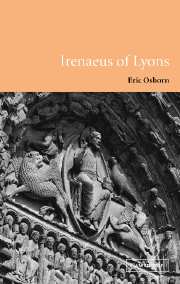Book contents
- Frontmatter
- Contents
- Preface
- List of abbreviations
- Chapter 1 Irenaeus: argument and imagery
- Part I DIVINE INTELLECT
- Chapter 2 One God: Intellect and love
- Part II ECONOMY
- Part III RECAPITULATION
- Part IV PARTICIPATION
- Part V CONCLUSION
- Appendix: Gnosticism
- Select bibliography
- Citations from Irenaeus
- Citations from the bible
- Index of classical authors
- Index of patristic authors
- General index
Chapter 2 - One God: Intellect and love
Published online by Cambridge University Press: 22 September 2009
- Frontmatter
- Contents
- Preface
- List of abbreviations
- Chapter 1 Irenaeus: argument and imagery
- Part I DIVINE INTELLECT
- Chapter 2 One God: Intellect and love
- Part II ECONOMY
- Part III RECAPITULATION
- Part IV PARTICIPATION
- Part V CONCLUSION
- Appendix: Gnosticism
- Select bibliography
- Citations from Irenaeus
- Citations from the bible
- Index of classical authors
- Index of patristic authors
- General index
Summary
Irenaeus presents an immediate, infinite God whose presence streams through his creation in goodness and beauty. This immediacy comes because unity and universality are ruled by transcendent love. While transcendence commonly implies separation, transcendent love implies immediacy. The unknowable God has become knowable as universal Intellect in his good economy for all creation. Irenaeus describes himself (3.6.3, 4) as standing like Elijah before the prophets of Baal on Mount Carmel (1 Kings 18:36) to pray to the God of all creation, the father of Jesus Christ and the God of the patriarchs:
Therefore I also call upon you, Lord God of Abraham, and God of Isaac and God of Jacob and Israel, you who are the father of our Lord Jesus Christ, the God who, through the greatness of your mercy have shown favour to us, that we should know you, who have made heaven and earth, who exercise rule over all, you who are the only and true God, above whom there is no other God.
The Mount Carmel prayer is the motif of Irenaeus' theology. It is part of God's economy and is anticipatory of Christ. Irenaeus' account of God is rich because it rejects diverse errors and draws on diverse strands of intellectual tradition; yet, whatever the complexity, God remains one and universal.
God is the intimate, ultimate, personal and transcendent first cause of all things. ‘His greatness lacks nothing but contains all things, comes close to us and is with us’ (4.19.3).
- Type
- Chapter
- Information
- Irenaeus of Lyons , pp. 27 - 48Publisher: Cambridge University PressPrint publication year: 2001

